One of the worries of the modern economy is how quickly automation is rendering certain jobs obsolete. This isn’t a new phenomenon, but we are starting to realize that many supposed “safe” careers are in danger or being mostly (or entirely) outsourced to machines.
Automachef tasks you with working within that narrative – you are tasked with building entirely automated kitchens to get hungry customers what they want. In order to do so, you have to analyze the situation and come up with a solution by managing your resources and creating assembly lines.
It’s a game of problem-solving with programming commands; it gets wickedly complex in a hurry and will definitely scratch that puzzle-solving itch that a select group of gamers need to fulfill.
01000110 01101111 01101111 01100100
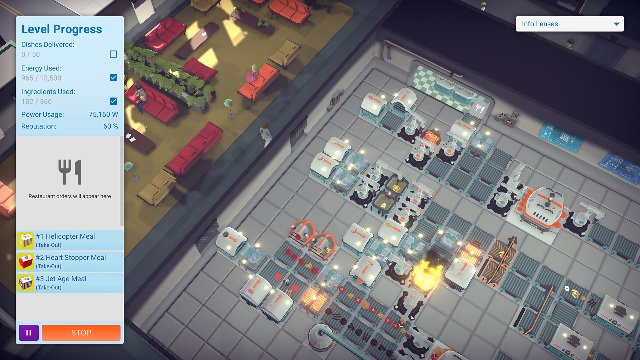
Automachef is essentially a programming game, albeit in a bit of a different presentation. In the main campaign mode, you will be given a limited menu of food items, a budget, a maximum amount of ingredients to use, and an electricity limit. You then must build a series of machines to create the dishes your customers order that fulfill the requirements.
This starts simple, but quickly ramps up and demands that you work as efficiently as possible. You’ll begin with just a few conveyor belts, grills, and cranes to move things from one place to another. Soon, you’ll be building complex machines full of “if/then” triggers and branching pathways.
There isn’t a lot of room for experimentation in Automachef; not many puzzles have multiple solutions. This can be frustrating in some regards; it isn’t the best at introducing new machinery elements, so you can get completely stuck if you can’t wrap your brain around exactly how a certain part works. At the same time, this is really the best teacher of Automachef‘s many pieces of machinery — you generally can’t move forward until you’ve effectively utilized everything available to you in a given level.
Autopilot
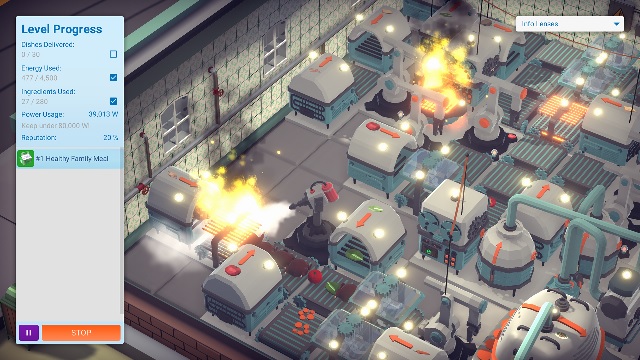
In one level, you may be running a burger shop. You’ll have to place an assembler, which creates the burgers out of the ingredients that each pop out of their own dispenser. However, they all have to come down different conveyor belts: a burger patty needs to hit the grill before it’s ready, whereas cheese will need to go through a slicer. The lettuce is fine as is.
But wait, there’s more.
Dispensers just spit out ingredients at set timing intervals. Since you have a limit to how many ingredients you can use, you’ll need to set up other machines that tell your dispensers what to do whenever an order comes in.
Grills use a lot of electricity and don’t have triggers to turn on and off on their own, so those same machines that direct your dispensers can also tell your grills when to operate. They can only be connected to four machines at a time, however, and your budget is probably already going to be too high to add another one.
You see how this works?
Everything in Automachef is working automatically — you build the machine, press “Start”, and watch to see if it happens. You won’t be pressing triggers or helping the machine to run – it has got to do it on its own. It usually won’t the first time, forcing you to have to move some stuff around (or, in many cases, restart from the beginning) and try again.
Machine Learning
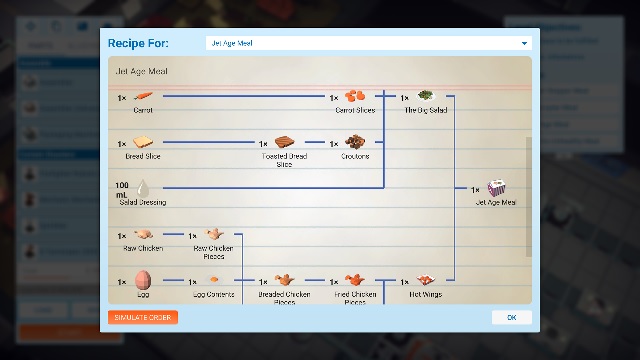
You have to know what you’re getting into with Automachef. Learning efficient programming takes a lot of repetition and a deep understanding of how systems work. Shortcuts and workarounds will only keep you afloat for so long; eventually, you will need to maximize your efficiency to make the most complex systems work.
For some, Automachef will nail that aspect and feel like a nice cozy blanket. Tearing the pieces apart and making them work in the absolute best manner possible can be extremely satisfying. For a large swath of gamers, however, games like Automachef can be too tedious for their own good.
“Oh, I need to build a machine to make ten BLTs,” you think.
The first time it doesn’t work, you tweak it a bit to try to fix things. The fourth time you build it, you start to grit your teeth. The sixth time you build it, you’re completely frustrated.
How many players are going to go back a seventh, tenth, fifteenth time, rearranging conveyor belts just so and optimizing their system to run 2% more efficiently to keep them under their electricity requirement?
As mentioned, for a select few, games like Automachef are exactly what you’re looking for. For the vast majority of gamers, it’s going to be far too fiddly and specialized. Chances are if this sounds like your type of game, it is.
System Requirements
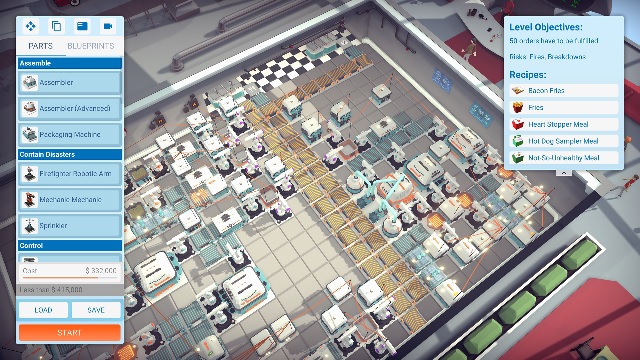
There are other modes to play besides the campaign mode in Automachef, although it’s likely you’ll want to start there, since it teaches you the ins and outs and gradually introduces the new parts you can add to your system.
If you love what the game has to offer, there is a lot of content here to sink your teeth into. Different modes, user-created levels, and mod support are all here, meaning there will probably wind up being more content available then you’ll have time for.
On a technical level, Automachef very much looks and sounds like an indie game — and we aren’t saying that as an insult. Rather, you know what you’re getting.
Graphics are somewhat cartoony, but everything is clear and distinct. Once you have put a bit of time into Automachef, you’ll have no problem identifying different pieces of machinery on sight. The brightly colored ingredients stand out on the monotone machinery, so there is an assembly line satisfaction that triggers when you watch your machines run.
There’s also a bit of a storyline going on here. Your boss is a “human” named Robert Person who just wants other humans to enjoy the food you make together.
You’ve probably seen the joke play out before – it’s actually a robot trying (and failing) to act human, making forced small talk while trying to conquer the world.
It’s cute, but the “endless charm and quirky humor” promised by Automachef‘s description is maybe a bit of a stretch. You might grin a few times, but Robert’s pre-level banter can get tedious since you have to read it. He might introduce how a new machine works, or introduce a stipulation to the level.
Cheeseburger, Cheeseburger, Cheeseburger
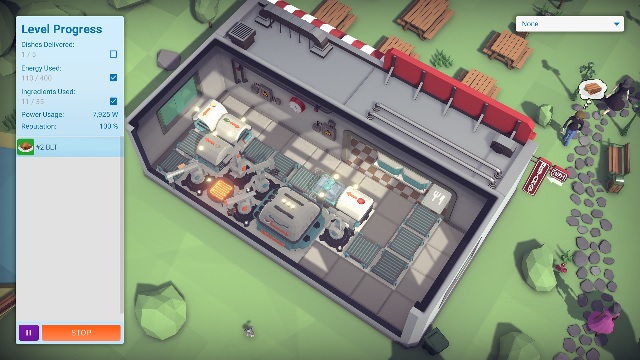
Pros:
- Unique way of approaching programming puzzles
- Puzzles are well designed and intricate
Cons:
- Repetitive
- Only one real solution to most problems
- Humor gets a bit stale
Automachef is probably not going to convert people into the programming/puzzle genre. If you’ve tried similar games and haven’t found them to your liking, it seems doubtful that this one does enough to win anyone over.
That said, this type of game will definitely press right buttons for a certain subset of people. Everything it does it does well, and there is a lot of content here (with the possibility for plenty more through mods and the Steam Workshop). Just know that it isn’t reinventing the wheel of the genre.
[Note: A copy of Automachef was provided by Team17 Digital Limited for the purpose of this review.]

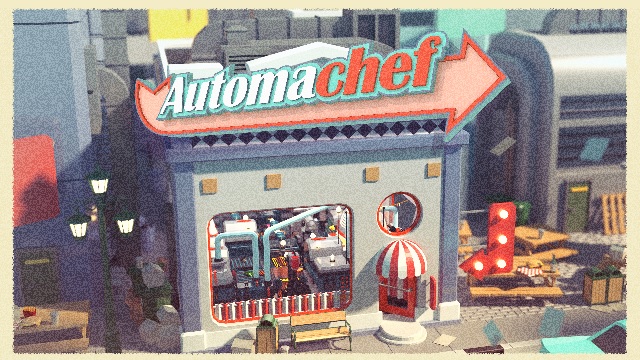





Published: Jul 22, 2019 10:19 am